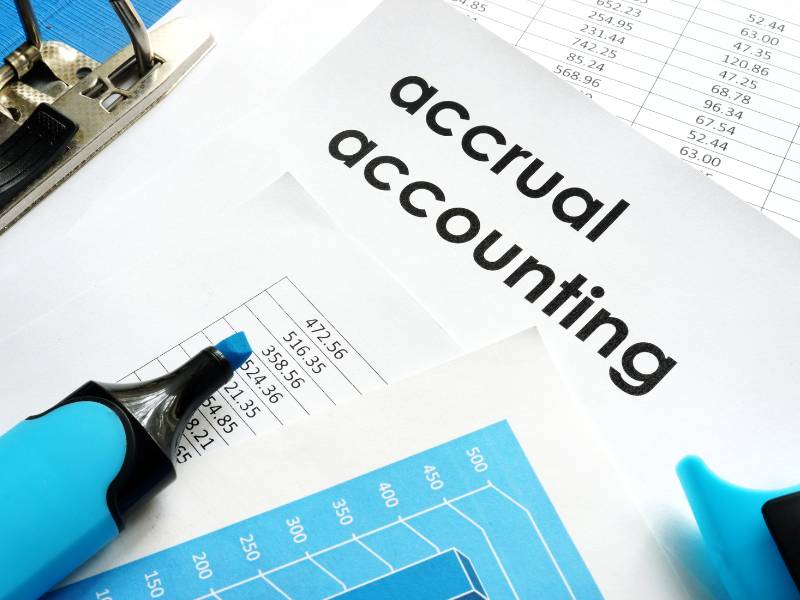Accrual Accounting Guide
Are you a business owner looking to become more organized with your finances?
Accrual accounting is a vital tool that helps many businesses keep track of their revenues and expenses over time. But every tool has its benefits and drawbacks, so it’s important to understand what accrual accounting is and how it can be used in your business.
Table of contents:
- What is accrual basis accounting method
- What are the types of accruals accounting
- Example of accrual accounting method
- Benefits of accruals accounting
- Drawbacks of accruals accounting
- Who uses accrual accounting
- What is cash basis accounting
- What are the types of cash accounting
- Examples of cash accountings
- Benefits of cash accounting
- Drawbacks of cash accounting
- Who uses cash accounting?
- FAQ’s
What is an Accounting Method?
An accounting method is a set of generally accepted accounting principles and procedures that record and report financial transactions. It defines how the assets, liabilities, revenues, and expenses of a company are to be reported in its books.
There are two main types of accounting methods – cash and accrual accounting.
Types of Accruals Accounting
There are two types of accrual accounting: the deferred and accrued method.
- Deferred method: recognizes expenses when they are incurred, but does not record revenue until it is earned.
- Accrued method: recognizes revenue when it is earned, but does not recognize expenses until they are incurred.
Examples of Accrual Accounting
⇒ An example of a deferred accounting method is when a company pays for a service before it is performed. The revenue from that service will not be recognized until the work has been completed.
⇒ An example of an accrual method is when a company is billed for services that have been rendered. The revenue for those services will be recognized as soon as the invoice is received.
Who Uses Accrual Accounting?
Accrual accounting is a popular accounting method used by businesses of all sizes, from small startups to large multinational corporations. It is a standard accounting practice that records net sales and cost at the time of the transaction, regardless of when cash is exchanged.
5 Benefits of Accruals Accounting
- Financial reporting accuracy: Provides a more accurate picture of a company’s financial performance by matching expenses to the related revenue in the same.
- Cash flow management: It allows certain businesses to better manage their cash flow by recognizing when payments are due and when they need to be received.
- Increased transparency: Helps increase transparency into a business’s finances, providing stakeholders with an accurate view of its financial health at any given time.
- Efficient tax planning: With accruals accounting, smaller businesses can plan and pay taxes more efficiently as it recognize revenues and expenses during the same period rather than waiting until cash payment is made or received.
- Enhanced decision-making: By recognizing revenue and accrued expense when occur, managers have access to up-to-date information which enables them to make informed decisions about their business operations quickly and accurately.
5 Drawbacks of Accruals Accounting
- Increased complexity: Requires more complex bookkeeping and involves additional records of entries for matching revenues and expenses in the same period. This can lead to errors, and incorrect reporting, and ultimately make it difficult to accurately report financial results.
- Require expertise: A business must have knowledgeable personnel to handle accrual accounting for the data to be accurate and reliable. Hiring an accountant or other qualified professional may be necessary in order to properly manage the.
- Time-consuming: Accruals accounting is a time-consuming accounting process as all transactions occur must be recorded in order to ensure that expenses and revenues are matched up correctly. It also requires regular reconciliation which can take up valuable time and resources.
- Cash forecasting: Does not provide an accurate picture of a business’s current cash flow situation which can lead to difficulties when forecasting future cash flows.
- Prone to manipulation: As accrual basis accounting relies heavily on estimates and assumptions, it can be easily manipulated if not monitored closely, leading to inaccurate financial statements which could result in legal issues for the business down the line.
What is Cash Basis Accounting?
Cash basis accounting is an accounting method that recognizes turnover and expenses only when cash is exchanged. This means that income is recognized when money is actually received and expenses are recognized when they are paid out of the business’s bank accounts payable.
Types of Cash Accounting
There are two types of cash basis accounting: accrual basis and modified accrual accounting.
- Accrual basis accounting: recognizes revenue and cost when they are earned or incurred, regardless of when the cash is actually exchanged.
- Modified basis accounting: recognizes revenue when it is earned or received, and expenses when they are due or incurred.
Examples of Cash Accountings
⇒ Recording sales when money is received from customers and recording expense when cash payments is made to suppliers.
eg. if a business receives from customers for goods or services, the revenue is recognized in that period. Similarly, when an expense is paid out of the business’s bank account, such as rent or utilities, it is recognized in that period.
5 Benefits of Cash Accounting
- Improved cash flow: Cash basis accounting helps larger businesses track their cash inflows and outflows more accurately, allowing them to better manage their finances.
- Budgeting and forecasting: With accurate records of income and expense, businesses can create more reliable budgets and financial forecasts that are based on actual performance data.
- Tax filing: By recognizing revenue when it is received or earned, businesses can make sure they report the correct amount of taxable income for each tax period.
- Reduced risk of fraud: Because only transactions involving actual money exchange hands are recorded in the books, there is less chance for fraudulent activities to go unnoticed by the business owners or auditors.
- Simplified bookkeeping: The straightforward nature of cash basis accounting makes it easier to recording transactions in the books without having to worry about complicated accrual methods or complex calculations.
5 Drawbacks of Cash Accounting
- Limited visibility into future earnings: Without the ability to recognize revenue until cash is received, cash basis accounting can make it difficult to accurately predict future profits and losses.
- Missed opportunities for tax deductions: By not being able to record expense until it is paid, businesses may miss out on potential tax deductions for the current year.
- Inaccurate statements: Without considering future cash flow, financial statements such as income statements and balance sheets can be misleading since they will not include all of a company’s assets and liabilities.
- Difficulty obtaining financing: Because cash basis accounting provides a limited view into a business’s financial position, it can make it difficult for businesses to obtain financing from banks or other lenders.
- Inability to track accounts receivable: Without the ability to recognize revenue until cash is received, businesses may not be able to accurately track customer payments that are due but have yet to be collected.
Frequently Asked Questions
=> WHAT IS GAAP?
GAAP (Generally Accepted Accounting Principles) is a set of accounting standards and principles that are used by businesses and organizations to ensure accuracy, transparency, and consistency in the preparation of financial statements.
=> WHAT IS IFRS?
IFRS (International Financial Reporting Standards) is a set of international accounting standards that are developed and maintained by the International Accounting Standards Board (IASB). IFRS is used by businesses and organizations across the world to ensure accurate reporting of financial results.
=> WHAT IS THE DIFFERENCE BETWEEN MODIFIED BASES AND ACCRUAL ACCOUNTING?
⇒ The primary is the timing of when revenues and expenses are recognized. With accrual accounting, revenue and charge are recorded when they are earned or incurred, regardless of when cash is actually exchanged.
⇒ Modified basis accounting, on the other hand, recognizes revenue when it is earned or received and expense when is incurred or paid.
=> SHOULD SMALL BUSINESS USE CASH OR ACCRUAL ACCOUNTING?
Small businesses should carefully consider their needs and capacity when deciding between and accrual accounting. Cash method is often simpler for small business owners to manage, as it requires fewer complex calculations and does not need to account for future cash flows.
=> WHICH IS BETTER CASH BASIS OR ACCRUAL BASIS?
The choice between cash-basis and accrual-basis accounting ultimately depends on the needs of the business. Cash basis accounting is simpler and easier to administer, as it only records cash.
=> IS AN ACCRUAL A DEBIT OR CREDIT?
In accrual accounting, a debit is used to record an increase in assets or expenses, while a credit is used to record an increase in liabilities, equity, or revenue. The double-entry system of bookkeeping requires that when one account is debited, another must be credited by the same amount.
Conclusion
Cash basis method is a great option for small businesses due to its simplicity and straightforwardness. While it does have some drawbacks, such as limited visibility into future earnings or missed opportunities for tax purposes, cash basis accounting can be an effective way of tracking transactions without having to worry about complicated calculations.
For those who need help deciding between cash and accrual basis accounting, consulting with a qualified accountant may be the best approach. Ultimately, selecting the right bookkeeping system will depend on your individual business needs.T




